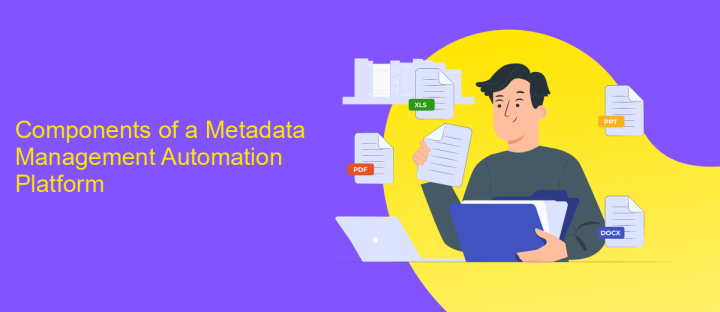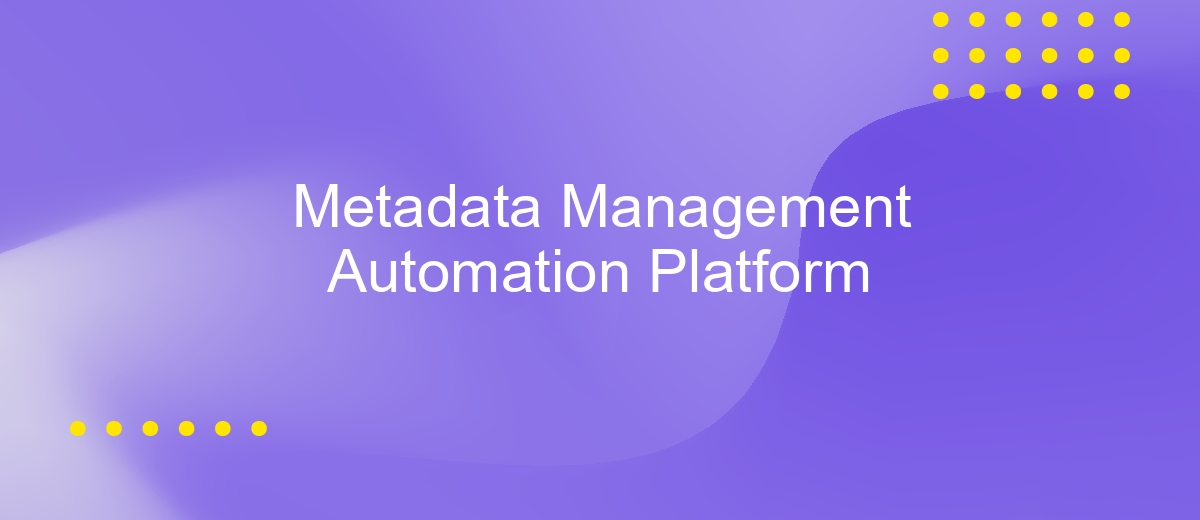Metadata Management Automation Platform
In today's data-driven world, efficient management of metadata is crucial for businesses striving to harness their data assets effectively. The Metadata Management Automation Platform offers a comprehensive solution, streamlining the organization, integration, and governance of metadata. By automating complex processes, this platform enhances data quality, reduces manual workload, and ensures compliance, empowering organizations to make data-driven decisions with confidence.
Introduction
In the era of big data, managing metadata efficiently is crucial for organizations striving to maintain data quality, governance, and compliance. A Metadata Management Automation Platform offers a comprehensive solution to streamline and automate the handling of metadata, ensuring that data assets are well-documented and easily accessible. This platform integrates with various data sources, providing a unified view of metadata across the enterprise.
- Enhanced data governance and compliance
- Improved data quality and consistency
- Streamlined data integration and interoperability
- Automated metadata capture and cataloging
- Real-time metadata updates and synchronization
By leveraging a Metadata Management Automation Platform, organizations can significantly reduce the manual effort involved in metadata management, allowing data stewards and analysts to focus on more strategic tasks. This not only enhances operational efficiency but also ensures that metadata is always up-to-date, accurate, and readily available for decision-making processes. As a result, businesses can achieve better data-driven insights and maintain a competitive edge in the market.
Components of a Metadata Management Automation Platform

A Metadata Management Automation Platform comprises several key components that streamline the process of managing metadata across various systems. The first crucial component is the metadata repository, which serves as a centralized storage for all metadata assets. This repository ensures that metadata is consistently cataloged, easily accessible, and maintains a single source of truth. Another essential component is the data lineage tracker, which provides a visual representation of data flow and transformation across the organization. This tool helps in understanding the origin, movement, and dependencies of data, thereby enhancing data governance and compliance efforts.
Integration capabilities are also a vital part of a robust Metadata Management Automation Platform. Tools like ApiX-Drive facilitate seamless integration with various data sources and applications, enabling automated data synchronization and reducing manual intervention. Additionally, the platform includes a metadata analytics module, which offers insights and reporting on metadata usage, quality, and trends. This component empowers organizations to make informed decisions based on comprehensive metadata analysis. Finally, a user-friendly interface and role-based access control ensure that stakeholders at different levels can efficiently interact with the platform while maintaining data security and privacy.
Benefits of Metadata Management Automation

Implementing a Metadata Management Automation Platform offers numerous advantages that streamline data handling processes and enhance overall efficiency. By automating metadata management, organizations can significantly reduce manual tasks, thereby minimizing errors and ensuring data consistency across systems.
- Efficiency: Automation reduces the time and effort required for metadata management, allowing teams to focus on more strategic tasks.
- Data Quality: Consistent and accurate metadata improves data quality, which is crucial for reliable analytics and decision-making.
- Compliance: Automated metadata management ensures adherence to regulatory requirements by maintaining accurate and up-to-date records.
- Scalability: The platform can easily scale to accommodate growing data volumes without compromising performance.
- Cost Savings: Reducing manual intervention leads to lower operational costs and better resource allocation.
Incorporating a Metadata Management Automation Platform not only optimizes data governance but also provides a competitive edge by enabling faster, more informed business decisions. This technological advancement is essential for organizations aiming to leverage their data assets effectively in an increasingly data-driven world.
Challenges of Implementing Metadata Management Automation

Implementing a Metadata Management Automation Platform presents several significant challenges for organizations. One of the primary obstacles is the integration with existing systems and data sources. Many organizations have a complex web of legacy systems, making seamless integration difficult and time-consuming.
Another challenge is ensuring data quality and consistency across various platforms. Automated systems rely heavily on accurate metadata, and any discrepancies can lead to errors and inefficiencies. Establishing robust data governance policies is crucial but often challenging to implement effectively.
- Integration with legacy systems
- Ensuring data quality and consistency
- Establishing robust data governance policies
- Managing change and user adoption
Moreover, managing change and ensuring user adoption are critical for the success of any automation initiative. Users must be adequately trained and convinced of the system's benefits to ensure smooth implementation. Addressing these challenges requires a well-thought-out strategy and a commitment to continuous improvement.


Future of Metadata Management Automation
The future of metadata management automation is poised to revolutionize how organizations handle their vast and complex data ecosystems. Emerging technologies like artificial intelligence and machine learning will play a critical role in automating metadata tagging, classification, and management processes. These advancements will enable real-time data insights and significantly reduce the manual effort required, allowing data professionals to focus on more strategic tasks. Additionally, enhanced data governance frameworks will ensure that metadata remains accurate, consistent, and compliant with regulatory standards.
Integration capabilities will also be a cornerstone of future metadata management platforms. Services like ApiX-Drive, which facilitate seamless integration between various applications and databases, will become increasingly vital. These integrations will enable automated data flow and synchronization, ensuring that metadata is always up-to-date across all systems. As a result, organizations will achieve more efficient data operations and improved decision-making processes. In essence, the future of metadata management automation will be characterized by intelligent, integrated, and highly efficient systems that drive business value and innovation.
FAQ
What is a Metadata Management Automation Platform?
How can a Metadata Management Automation Platform benefit my organization?
What types of metadata can be managed on this platform?
How difficult is it to integrate a Metadata Management Automation Platform with existing systems?
Can I customize the platform to fit my organization’s specific needs?
Strive to take your business to the next level, achieve your goals faster and more efficiently? Apix-Drive is your reliable assistant for these tasks. An online service and application connector will help you automate key business processes and get rid of the routine. You and your employees will free up time for important core tasks. Try Apix-Drive features for free to see the effectiveness of the online connector for yourself.

